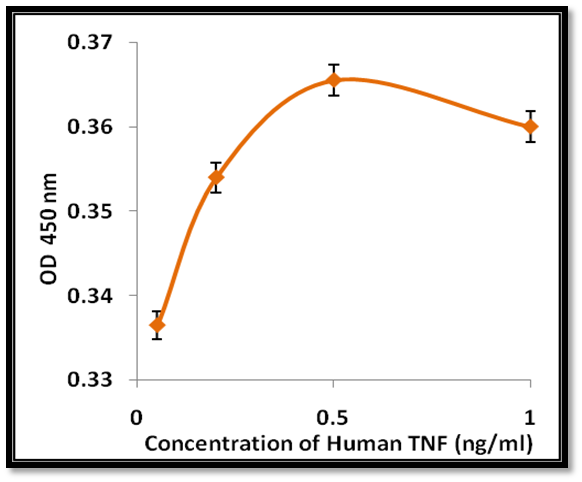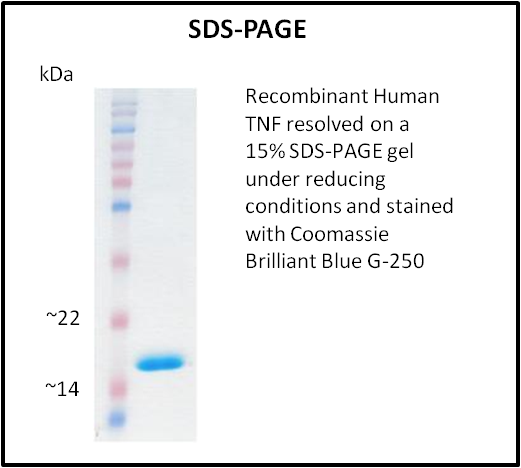Recombinant Human TNF (E. coli)
Specifications
| Description | Tumor Necrosis Factor is secreted by macrophages, monocytes, neutrophils, T cells, natural killer cells following their stimulation by bacterial lipopolysaccharides although cells expressing CD8(+) secrete little or no TNF-alpha. In addition, TNF is secreted by peripheral neutrophilic granulocytes and by a number of transformed cell lines that include those of astrocytes, microglial cells, smooth muscle cells and fibroblasts. Human milk also contains this factor. The synthesis of TNF-alpha is induced by many different stimuli including interferons, IL2, GM-CSF, SP, Bradykinin, Immune complexes, inhibitors of cyclooxygenase and platelet activating factor. TNF-alpha shares approximately 30% homology with TNF-beta. Human TNF-alpha is a non-glycosylated protein of 17.6 kDa. |
| SKU | Z100855 |
| Unit quantity | 50 µg |
| Family | TNF Super-family |
| Aliases |
TNFSF2, Cachectin, Differentiation-inducing factor (DIF), Necrosin, Cytotoxin Recombinant Human Tumor Necrosis Factor Alpha (TNF) |
| Gene Symbol | TNF |
| Gene ID | 7124 |
| Accession Number | P01375 |
| Source | E. coli |
| Species | Human (H. sapiens) |
| Appearance | Lyophilized Powder |
| Molecular Weight | 17.6 kDa |
| Endotoxin Level | <1.0 EU/µg of recombinant protein as determined by the LAL method |
| Purity | >95% as determined by SDS-PAGE |
| Formulation | Lyophilized from a 0.2 μm filtered solution in PBS (pH 7.2) |
| Function | The ED50 as determined by dose dependent proliferation of IL4 stimulated human megakaryocytic cell line was found to be ≤0.5 ng/mL |
| Reconstitution | A quick spin of the vial followed by reconstitution in distilled water to a concentration not less than 0.1 mg/mL. This solution can then be diluted into other buffers. |
| Storage | The lyophilized protein is stable for at least one year from date of receipt at -70°C. Upon reconstitution, this cytokine can be stored in working aliquots at 2° - 8°C for one month, or at -20°C for six months, with a carrier protein without detectable loss of activity. Avoid repeated freeze/thaw cycles. |
| Usage | For research use only. Not for diagnostic or therapeutic use. |
STR
There are no STR for this product yet!
FAQs
There are no FAQs for this product yet!
References
- Tang, X., McMullen, T. P., & Brindley, D. N. "Increasing the low lipid phosphate phosphatase 1 activity in breast cancer cells decreases transcription by AP-1 and expressions of matrix metalloproteinases and cyclin D1/D3" Theranostics 9(21):6129 (2019).
Controls and Related Product:
Other Cell Lines
Select Species:
African Green Monkey (C. aethiops)
(0)
Bat
(0)
Bat (Chiroptera)
(0)
Bee
(0)
Bottlenose Dolphin (Tursiops)
(0)
Cabbage Looper (T. ni)
(0)
Cat (Feline)
(0)
Cattle
(0)
Chicken (Galline)
(0)
Chinese Hamster (C. griseus)
(0)
Cow (Bovine)
(0)
Deer (Cervidae)
(0)
Dog (Canine)
(0)
Duck (Anas)
(0)
Duck (Anatidae)
(0)
E. coli
(0)
European Sea Bass
(0)
European Sea Bass (D. labrax)
(0)
Fall Armyworm (S. frugiperda)
(0)
Fish
(0)
Fly (D. melanogaster)
(0)
Frog (Xenopus)
(0)
Fruit Fly (D. melanogaster)
(0)
Gilthead Sea Bream (S. aurata)
(0)
Goat (Capra)
(0)
Golden Hamster (M. auratus)
(0)
Goose (Anatidae)
(0)
Green Monkey (C. aethiops)
(0)
Green Monkey (C. sabaeus)
(0)
Hamster (M. auratus)
(0)
Horse (Equine)
(0)
Human
(0)
Human (H. sapiens)
(0)
Insect
(0)
Insect (Insecta)
(0)
Killifish (F. heteroclitus)
(0)
Luciola italica
(0)
Marmoset (Primate)
(0)
Mink
(0)
Mink (N. vison)
(0)
Monkey (Primate)
(0)
Moth (S. frugiperda)
(0)
Mouse
(0)
Mouse (M. musculus)
(0)
N/A
(0)
Other
(0)
Photinus pyralis
(0)
Pig (Porcine)
(0)
Quail (Coturnix)
(0)
Rabbit (Leporidae)
(0)
Rabbit (Leporine)
(0)
Rainbow Trout (O. mykiss)
(0)
Rat (R. norvegicus)
(0)
Rat (Rattus)
(0)
Renilla reniformis
(0)
Roundworm (C. elegans)
(0)
Rous Sarcoma Virus (RSV)
(0)
SARS-CoV-2
(0)
Sheep (Ovine)
(0)
Sheep (Ovis)
(0)
Turtle
(0)
Turtle (Testudines)
(0)
Universal
(0)
Zebrafish (D. rerio)
(0)
Select Tissue:
0
(0)
Achilles Tendon
(0)
Adipose
(0)
Adrenal Gland
(0)
Adrenal Glands
(0)
Airway
(0)
Airway/Lung
(0)
Amniotic Sac
(0)
Antimesometrial Decidua
(0)
Antler
(0)
Ascites
(0)
Auditory
(0)
Bee Cell
(0)
Bile Duct
(0)
Bladder
(0)
Blood
(0)
Blood (Immune)
(0)
Blood Vessel
(0)
Bone
(0)
Bone Marrow
(0)
Brain
(0)
Breast
(0)
CAF, Tumor
(0)
Caput Epididymis
(0)
Cartilage
(0)
Cerebrospinal Fluid
(0)
Cervix
(0)
Colon
(0)
Connective Tissue
(0)
Cord Blood
(0)
Digestive
(0)
Digestive System
(0)
Ear
(0)
Embryo
(0)
embryonic
(0)
Endometria
(0)
Endometrium
(0)
Esophagus
(0)
Eye
(0)
Fallopian Tube
(0)
Fibroblast
(0)
Gingiva
(0)
Hair
(0)
Hair Follicle
(0)
Head/Neck
(0)
Heart
(0)
HeLa
(0)
Hepatocellular Carcinoma
(0)
Hippocampus
(0)
Intestinal
(0)
Intestine
(0)
Kidney
(0)
Kidney, Cortex/Proximal tubule
(0)
Labial Salivary Gland
(0)
Larynx
(0)
Liver
(0)
Lung
(0)
Lung Carcinoma
(0)
Lung, bronchus
(0)
Lymph
(0)
Lymph node
(0)
Lymphatic System
(0)
lymphoblast
(0)
Malignant melanoma
(0)
Mammary
(0)
Mesencephalic Tissue
(0)
Mesentery
(0)
Microglia
(0)
Mouth/Oral
(0)
Muscle
(0)
Myoblast
(0)
Nasal Mucosa
(0)
Nerve
(0)
Nervous System
(0)
Oesophageal
(0)
Oesophagus
(0)
Oral
(0)
Organ of Corti
(0)
Other
(0)
Ovary
(0)
Pancreas
(0)
Pancreatic
(0)
Parathyroid
(0)
Penile
(0)
Peripheral Blood
(0)
Peripheral Blood Mononuclear Cells
(0)
Peritoneal
(0)
Peritoneum
(0)
Pharynx
(0)
Pituitary
(0)
Pituitary Gland
(0)
Pituitary Tumor
(0)
Placenta
(0)
promyelocytic leukemia
(0)
Prostate
(0)
Prostate carcinoma
(0)
Renal
(0)
Reproductive
(0)
Reproductive System
(0)
Retina
(0)
Salivary Gland
(0)
Sciatic Nerve
(0)
Sertoli
(0)
Skeletal
(0)
Skeletal Muscle
(0)
Skin
(0)
Skin ; Keratinocytes
(0)
Small intestine
(0)
Smooth Muscle
(0)
Soft Tissue
(0)
Spinal
(0)
Spleen
(0)
Stem Cell
(0)
Stomach
(0)
Straitum
(0)
Sweat Gland
(0)
Tendon
(0)
Testes
(0)
Testis
(0)
Thymic
(0)
Thymus
(0)
Thyroid
(0)
Tongue
(0)
Tonsil
(0)
Trachea
(0)
Tumor
(0)
Umbilical Cord
(0)
Unknown
(0)
Urethra
(0)
Urinary Tract
(0)
Uterus
(0)
Uterus; endometrium
(0)
Vascular Endothelium
(0)
Ventral Mesencephalon
(0)
Vertebral Disc
(0)


